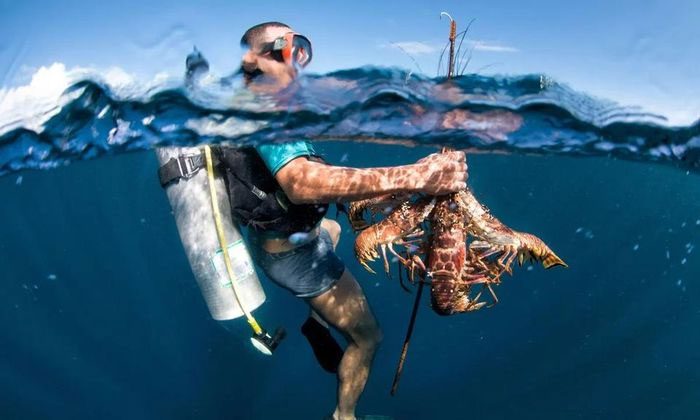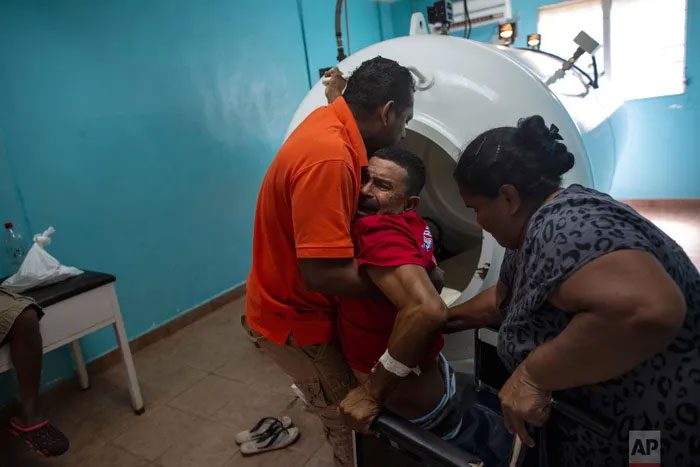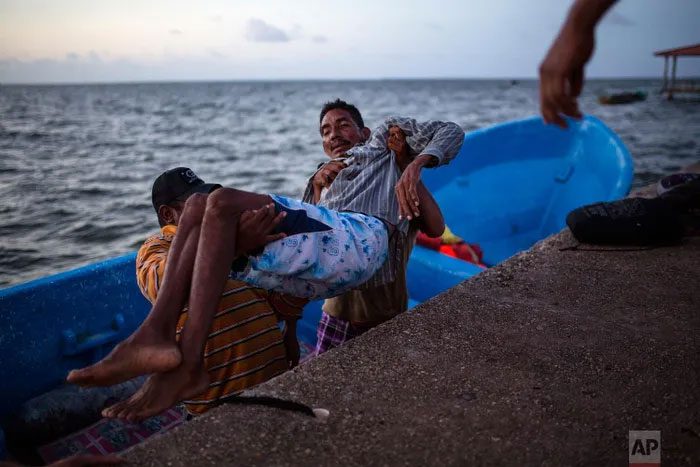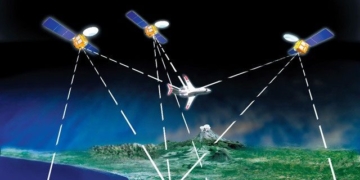Due to poverty, local Miskito divers in Honduras must work in the dangerous fishing industry with inadequate equipment. They often suffer from paralysis or even lose their lives.
On the main avenue of Puerto Lempira, a man sits outside a restaurant on a wooden cart, waving hello to another man who strolls by on a similar cart.

Lobster divers in Honduras. (Photo: Alamy).
Just a row of houses away, a man in a wheelchair is being pushed by a young woman past another man who is using crutches. In another corner, two men with canes walk leisurely in the shade.
At first glance, many might think this is a scene from a retirement community.
However, the men depicted are of all ages, and such scenes are common along the coast of Gracias a Dios – the indigenous territory in northeastern Honduras. Here, decades of unsafe fishing have left thousands of Caribbean divers disabled, according to the Guardian.
From Father to Son
According to the Center for Justice and International Law (Cejil), over 4,000 Miskito divers have been injured in recent years due to decompression sickness. At least 400 people have died, and countless others are missing at sea.

Paralyzed by decompression sickness, lobster diver Misael Banegas Díaz (49 years old) is taken into a treatment chamber by physiotherapist Cedrak Waldan Mendoza at a hospital in Puerto Lempira. (Photo: Rodrigo Abd/AP).
The lack of job opportunities in one of the poorest regions of Honduras forces many residents into a dilemma. They must dive and accept the risks, or else their entire family may fall into destitution.
“That is why the father is disabled, and then the son is disabled too,” said Pablo Padilla, a board member of the Association of Disabled Miskito Divers in Honduras (AMHBLI).
He also has limited mobility, bladder and bowel dysfunction, and chronic pain following a diving accident. “My family has 4 members who are disabled,” he said.
Last month, following a ruling by the Inter-American Court of Human Rights in a case filed on behalf of 42 divers, the Honduran government apologized to the divers and their families, pledging to provide compensation and implement systemic changes to prevent future casualties.
“I have no income, no job, nothing at all,” said Willy Gómez, one of the divers involved in the lawsuit, explaining that his injuries prevent him from working and supporting his family.
Gómez’s case is a stark example of the cruel irony faced by divers in the region.
They are compelled to work despite the dangers because they need to support their families. Yet, many suffer injuries so severe that their economic situation becomes worse than before.
Furthermore, fulfilling the authorities’ commitments to systemic change is often easier said than done.
“Everything (the government) says is correct and sounds good, but sometimes they say things they don’t follow through on,” Gilberto Palma, a former diver injured last year while lobster diving, which led to mobility restrictions, remarked.
The Roots
Decompression sickness occurs when a diver ascends too quickly, causing a sudden drop in water pressure that creates gas bubbles in the blood, potentially devastating the nervous system and vital organs, as well as leading to other illnesses.
In decompression sickness, gas bubbles form in specific areas, causing localized damage with corresponding clinical symptoms.

A diver is brought to the dock after being transported by boat to Puerto Lempira, Honduras, for treatment of decompression sickness. (Photo: AP/Rodrigo Abd).
If a patient is quickly taken to a decompression treatment chamber, exposed to high pressure and pure oxygen, the effects can be alleviated or even reversed.
Some divers told the Guardian that they have been taken to treatment chambers in Puerto Lempira completely paralyzed but have regained some mobility thanks to treatment.
However, many others are not so fortunate. They are taken to treatment too late.
“The pressure hit me while I was diving for lobsters at a depth of over 30 meters,” Palma said. “Eleven days later, I was taken to the decompression treatment chamber by the fishing company.”
The problem dates back to the 1970s when industrial fishing began in the area. It started with lobster harvesting, followed by conch, and in the last decade, sea cucumbers—an invertebrate with rough skin—have become a delicacy in many parts of Asia.
This overfishing has forced divers to search for seafood further offshore and in deeper waters, increasing the chances of injury.
“Every year you have to go deeper to find them, which is why more divers die,” a fishing boat captain said. “The boats lose crew members just as fishermen lose their fishing rods.”
The recreational diving limit is over 39.6 meters. However, it is not uncommon for Miskito divers to dive to depths greater than 45.7 meters without appropriate equipment.
Regulations have long been in place to protect divers and marine life, but in this remote area, state presence is limited, and there are few resources to patrol the territory on land or at sea.
This has turned the region into a crucial link in the cocaine trafficking route from South America to the United States, with many fishing boats being used for smuggling.
The symbiotic relationship between drug traffickers and fishermen makes the task of regulation more challenging and dangerous.
“The only thing that can help Miskito divers is if international organizations set up here; they can regulate fishing,” the captain stated.


















































